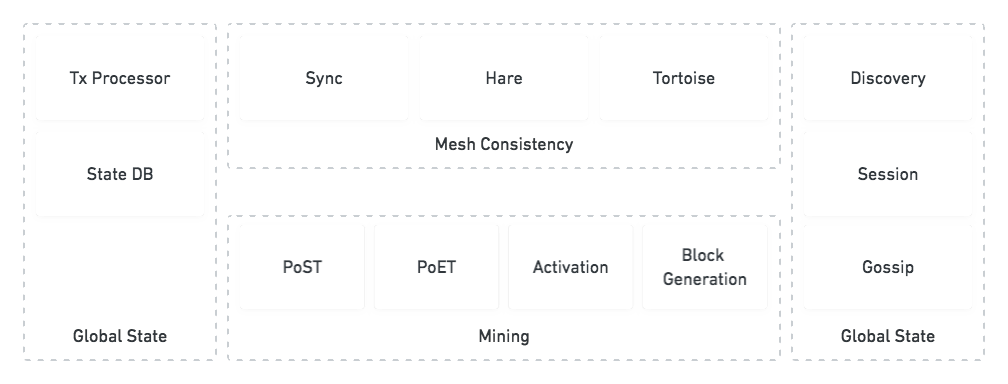 Documentation
¶
Documentation
¶
Overview ¶
go-spacemesh is a golang implementation of the Spacemesh node. See - https://spacemesh.io
 Directories
¶
Directories
¶
| Path | Synopsis |
|---|---|
|
Package activation is responsible for creating activation transactions and running the mining flow, coordinating Post building, sending proofs to PoET and building NIPost structs.
|
Package activation is responsible for creating activation transactions and running the mining flow, coordinating Post building, sending proofs to PoET and building NIPost structs. |
|
config
Package config provides configuration for GRPC and HTTP api servers
|
Package config provides configuration for GRPC and HTTP api servers |
|
mocks
Package mocks is a generated GoMock package.
|
Package mocks is a generated GoMock package. |
|
nolint
|
nolint |
|
weakcoin
Package weakcoin is a generated GoMock package.
|
Package weakcoin is a generated GoMock package. |
|
mocks
Package mocks is a generated GoMock package.
|
Package mocks is a generated GoMock package. |
|
Package bootstrap checks for the bootstrap/fallback data update from the spacemesh administrator (a centralized entity controlled by the spacemesh team).
|
Package bootstrap checks for the bootstrap/fallback data update from the spacemesh administrator (a centralized entity controlled by the spacemesh team). |
|
Package cmd is the base package for various sets of builds and executables created from go-spacemesh
|
Package cmd is the base package for various sets of builds and executables created from go-spacemesh |
|
node
Package node contains the main executable for go-spacemesh node
|
Package node contains the main executable for go-spacemesh node |
|
common
|
|
|
types
nolint
|
nolint |
|
util
Package util provides common utility functions.
|
Package util provides common utility functions. |
|
Package config contains go-spacemesh node configuration definitions
|
Package config contains go-spacemesh node configuration definitions |
|
Package eligibility defines fixed size oracle used for node testing
|
Package eligibility defines fixed size oracle used for node testing |
|
Package fetch contains mechanism to fetch Data from remote peers
|
Package fetch contains mechanism to fetch Data from remote peers |
|
mocks
Package mocks is a generated GoMock package.
|
Package mocks is a generated GoMock package. |
|
core
nolint
|
nolint |
|
core/mocks
Package mocks is a generated GoMock package.
|
Package mocks is a generated GoMock package. |
|
templates/multisig
nolint
|
nolint |
|
templates/vault
nolint
|
nolint |
|
templates/vesting
nolint
|
nolint |
|
templates/wallet
nolint
|
nolint |
|
Package hare implements the Hare Protocol.
|
Package hare implements the Hare Protocol. |
|
eligibility
Package eligibility is a generated GoMock package.
|
Package eligibility is a generated GoMock package. |
|
mocks
Package mocks is a generated GoMock package.
|
Package mocks is a generated GoMock package. |
|
Package layerpatrol keeps parties informed about the general progress of each layer.
|
Package layerpatrol keeps parties informed about the general progress of each layer. |
|
Package log provides the both file and console (general) logging capabilities to spacemesh modules such as app and identity.
|
Package log provides the both file and console (general) logging capabilities to spacemesh modules such as app and identity. |
|
Package malfeasance is a generated GoMock package.
|
Package malfeasance is a generated GoMock package. |
|
Package mesh defines the main store point for all the persisted mesh objects such as ATXs, ballots and blocks.
|
Package mesh defines the main store point for all the persisted mesh objects such as ATXs, ballots and blocks. |
|
mocks
Package mocks is a generated GoMock package.
|
Package mocks is a generated GoMock package. |
|
Package metrics defines telemetry primitives to be used across components.
|
Package metrics defines telemetry primitives to be used across components. |
|
Package miner is a generated GoMock package.
|
Package miner is a generated GoMock package. |
|
handshake
nolint
|
nolint |
|
peerexchange/mocks
Package mocks is a generated GoMock package.
|
Package mocks is a generated GoMock package. |
|
pubsub/mocks
Package mocks is a generated GoMock package.
|
Package mocks is a generated GoMock package. |
|
server
nolint
|
nolint |
|
server/mocks
Package mocks is a generated GoMock package.
|
Package mocks is a generated GoMock package. |
|
Package proposals is a generated GoMock package.
|
Package proposals is a generated GoMock package. |
|
mocks
Package mocks is a generated GoMock package.
|
Package mocks is a generated GoMock package. |
|
mocks
Package mocks is a generated GoMock package.
|
Package mocks is a generated GoMock package. |
|
systest
module
|
|
|
peersync
nolint
|
nolint |
|
peersync/mocks
Package mocks is a generated GoMock package.
|
Package mocks is a generated GoMock package. |
|
Package txs is a generated GoMock package.
|
Package txs is a generated GoMock package. |
Click to show internal directories.
Click to hide internal directories.










